Written by Martin Richards

From the Team at Teachers Who Coach At Teachers Who Coach, we believe that powerful change in education happens through meaningful conversations. As educators, we often support one another not just by sharing ideas, but by listening deeply, asking the right questions, and creating space for reflection. In other words, we coach. This book was born out of that belief. As our global community of educators continues to grow, we’ve seen a rising need for clear, practical tools that support teachers in developing their coaching skills. Whether you're mentoring a new colleague, leading a team meeting, or supporting a peer through a professional challenge, coaching provides a framework to help others think clearly, act confidently, and grow purposefully. We created this resource to make coaching more accessible, more structured, and more sustainable for educators everywhere. Inside, you’ll find a diverse collection of coaching models, some well-established, some newly developed, each designed to guide you through focused, empowering conversations. Every model is paired with thoughtful, ready-to-use coaching questions that you can take directly into your practice. Remember, every coaching conversation is an opportunity to learn and grow. Embrace the journey with curiosity and commitment.
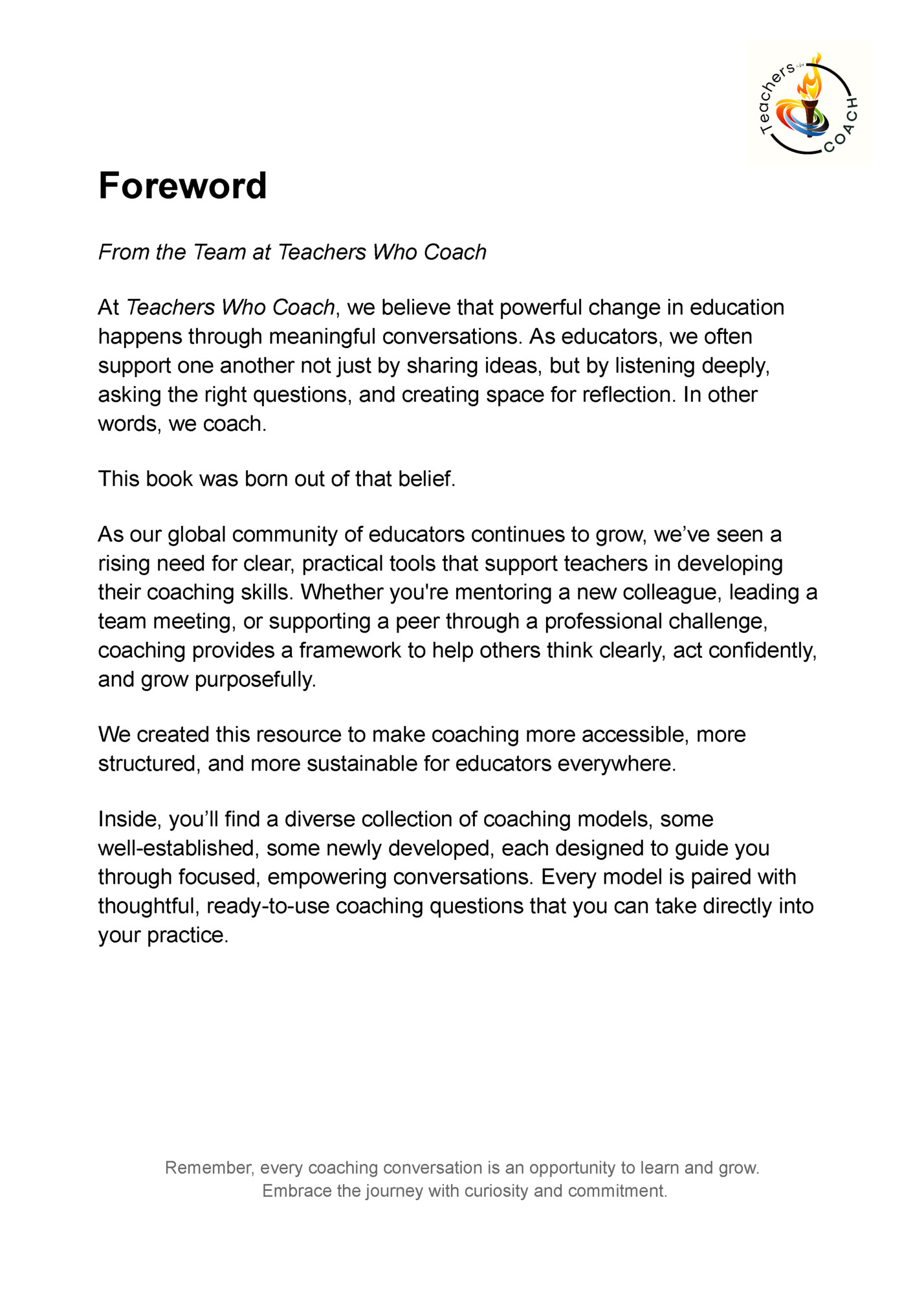
● Teachers supporting teachers ● Leaders building trust across teams ● Educators wanting to grow professionally through partnership We encourage you not only to explore the models, but to practice them with your peers. Coaching is a skill that grows through use, and reflection is most powerful when it’s shared. That’s why we invite you to connect with others on the journey at www.teacherswhocoach.org, where you can find practice partners, join peer groups, and access additional resources. Thank you for your commitment to coaching. With every conversation you lead, you’re making our schools more thoughtful, more connected, and more human. With respect and solidarity, Martin Richards and The Teachers Who Coach Team Remember, every coaching conversation is an opportunity to learn and grow. Embrace the journey with curiosity and commitment.
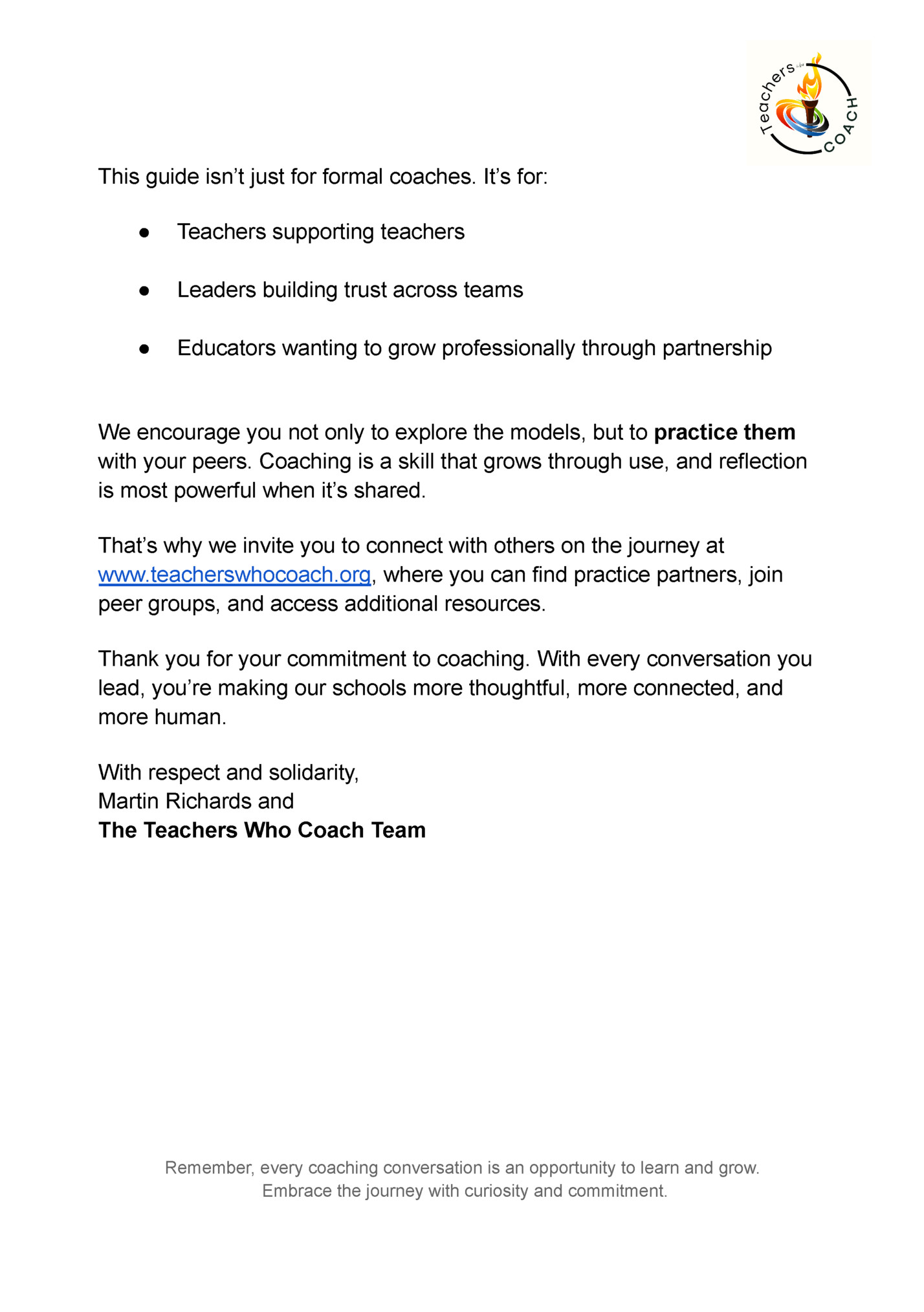
Introduction In today’s dynamic and student-centered learning environments, the role of educators is evolving beyond instruction. Teachers, leaders, and support staff are increasingly expected to serve as mentors, facilitators of growth, and coaches. Whether guiding a colleague through a professional challenge, supporting student development, or leading teams, coaching has become an essential skill for educators at every level. This book is your companion in developing a confident, effective, and reflective coaching practice. Inside, you'll find a curated collection of powerful, evidence-based coaching models, each with a clear structure, guiding questions, and a unique purpose. These models have been adapted for practical use in educational contexts and are designed to help you: ● Engage in meaningful, solution-focused conversations ● Foster trust and clarity with colleagues and learners ● Support growth mindsets and professional development ● Create actionable plans and sustainable change Whether you're new to coaching or refining your approach, this resource offers a flexible toolkit. You can choose a model that fits your context, personality, and the needs of those you support, whether you're helping a Remember, every coaching conversation is an opportunity to learn and grow. Embrace the journey with curiosity and commitment.
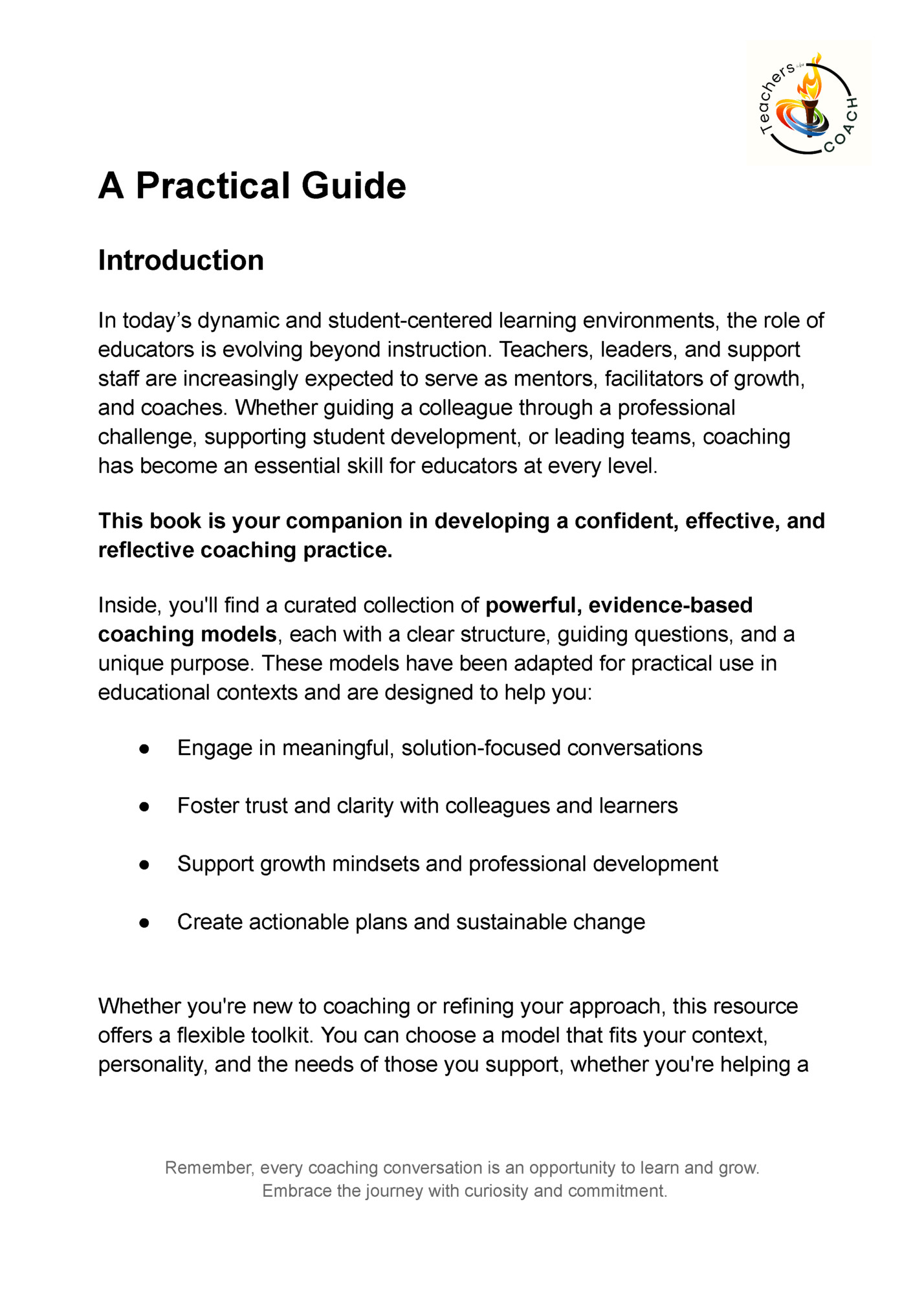
reflective dialogue with a team. How to Use This book Each model is introduced with a brief summary, followed by coaching questions organized around its key steps. Use these models as: ● Frameworks for one-on-one coaching sessions ● Guides for mentoring conversations with students or colleagues ● Templates for professional learning communities ● Personal reflection tools to strengthen your own growth mindset Most importantly, remember that effective coaching is built on curiosity, empathy, and the belief that others are capable of growth and change. This book will help you bring that belief to life, with structure, intention, and heart. Let’s grow your coaching skills, one conversation at a time. Remember, every coaching conversation is an opportunity to learn and grow. Embrace the journey with curiosity and commitment.
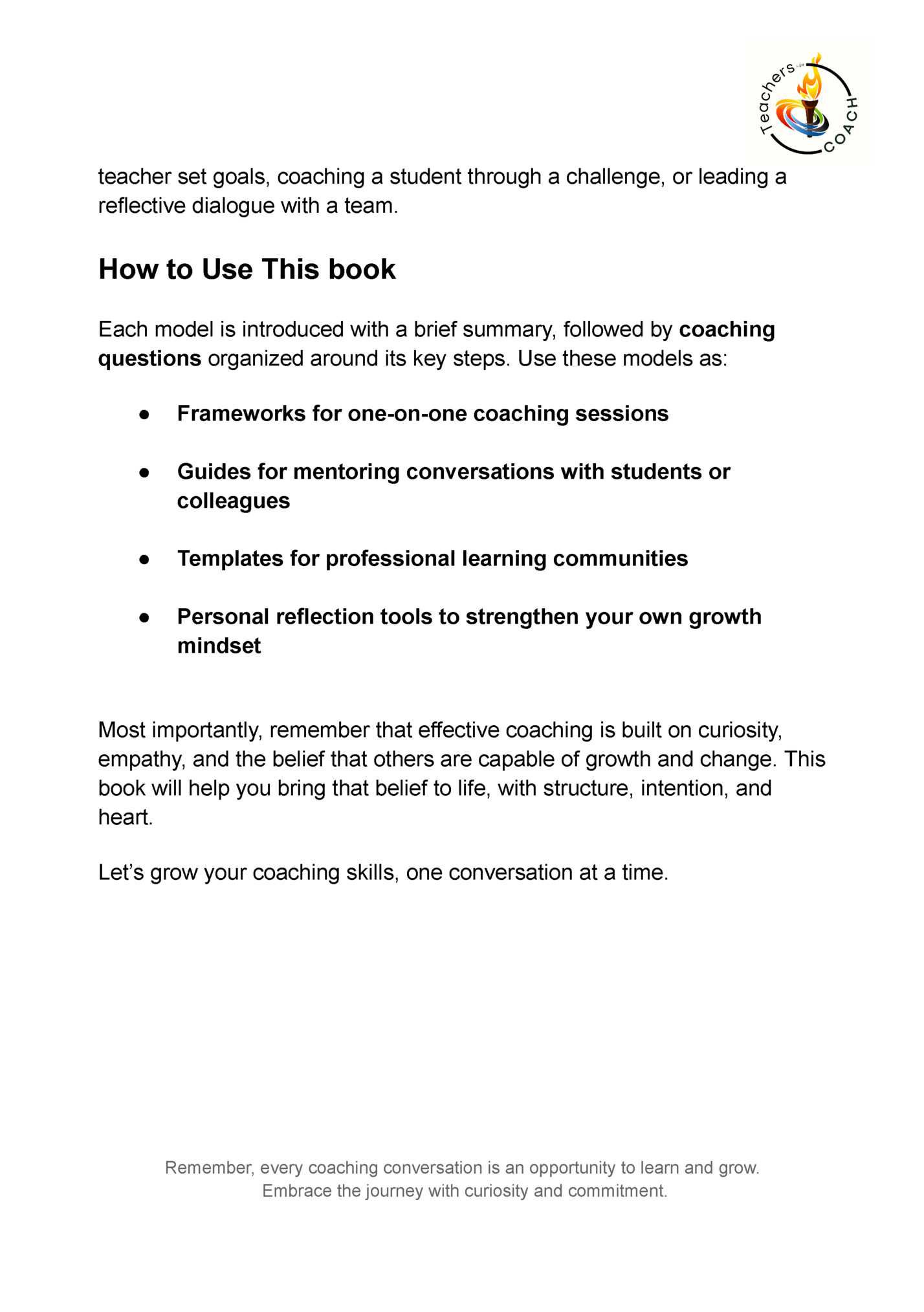
Teachers Who Coach At Teachers Who Coach, we believe that great educators don't just deliver content, they empower growth. Across classrooms, staff rooms, and school communities, more and more teachers are stepping into coaching roles to support colleagues, foster collaboration, and help others unlock their full potential. We created this book because we’ve seen firsthand what happens when teachers are equipped not only to teach, but to coach: ● Professional conversations deepen. ● School cultures shift toward trust and reflection. ● Leadership becomes more distributed, inclusive, and impactful. Why Coaching? Why Now? Education is more complex than ever, and the need for supportive, intentional dialogue among educators has never been greater. Coaching offers a way to meet that need. It helps teachers at all levels: ● ● ● ● Reflect more clearly on their practice Solve problems collaboratively Set goals with confidence Build stronger relationships across teams Coaching isn’t about having the answers, it’s about creating the space for others to discover their own. This resource is designed to help you do just that. Remember, every coaching conversation is an opportunity to learn and grow. Embrace the journey with curiosity and commitment.
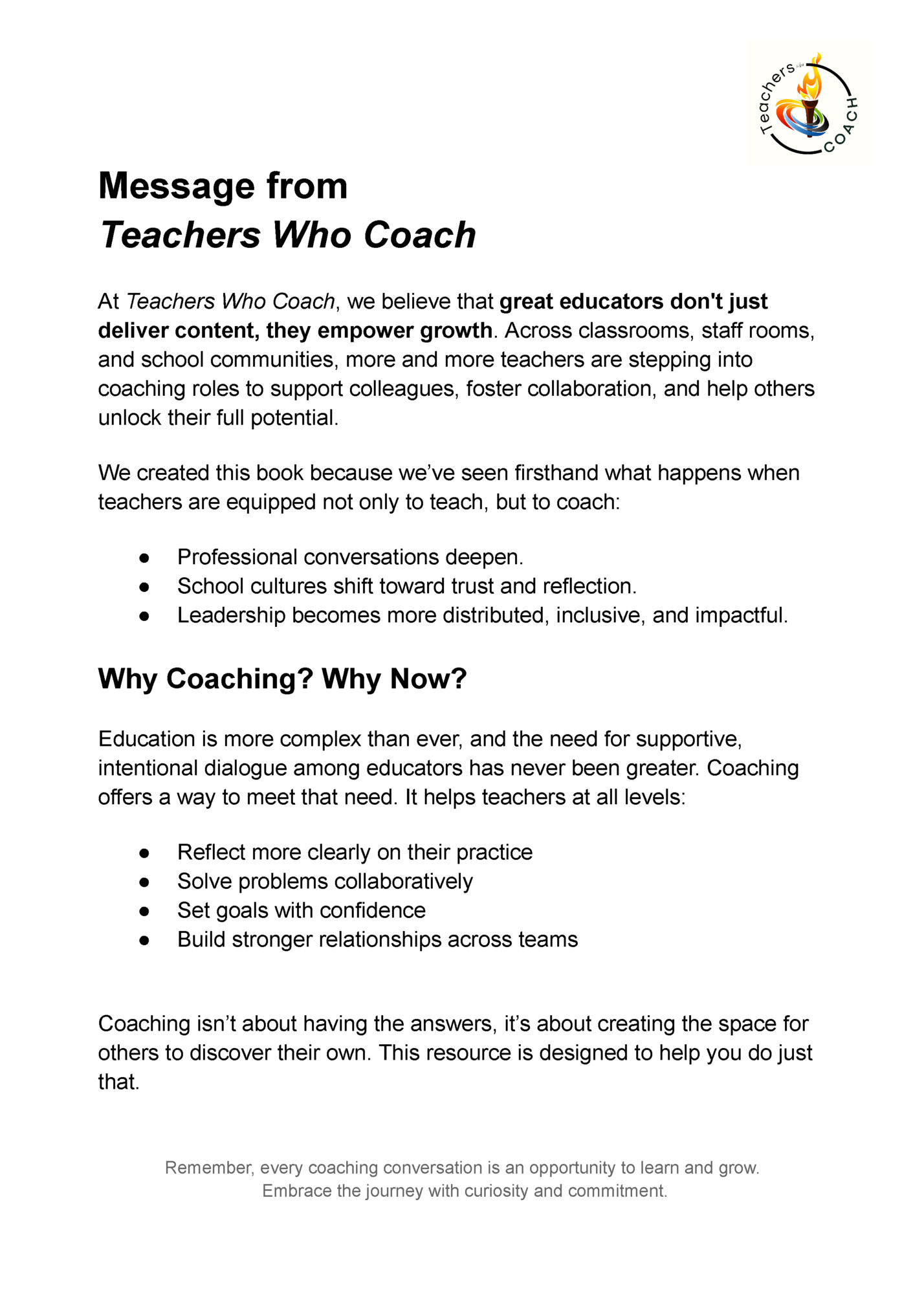
This guide was developed by Teachers Who Coach to give you a practical, flexible toolkit of coaching models that can be used in schools and education communities around the world. Each model included in this book: ● ● ● ● Provides a clear structure for coaching conversations Is adaptable to a wide range of situations and people Comes with guiding questions you can use right away Supports different coaching styles and stages of experience We’ve drawn on well-known frameworks as well as fresh, empowering models that reflect our core belief: every teacher has the potential to be a great coach, and every coach deserves great tools. Join the Movement If you’re reading this, you’re already part of a growing movement of educators choosing to coach with intention and heart. Use this resource to get started, or to go deeper, and don’t go it alone. Find your coaching partners. Join peer practice groups. Grow your confidence. Learn more and connect at www.teacherswhocoach.org Let’s keep raising the quality of coaching in education, one conversation at a time. With you in every step, The Teachers Who Coach Team Remember, every coaching conversation is an opportunity to learn and grow. Embrace the journey with curiosity and commitment.
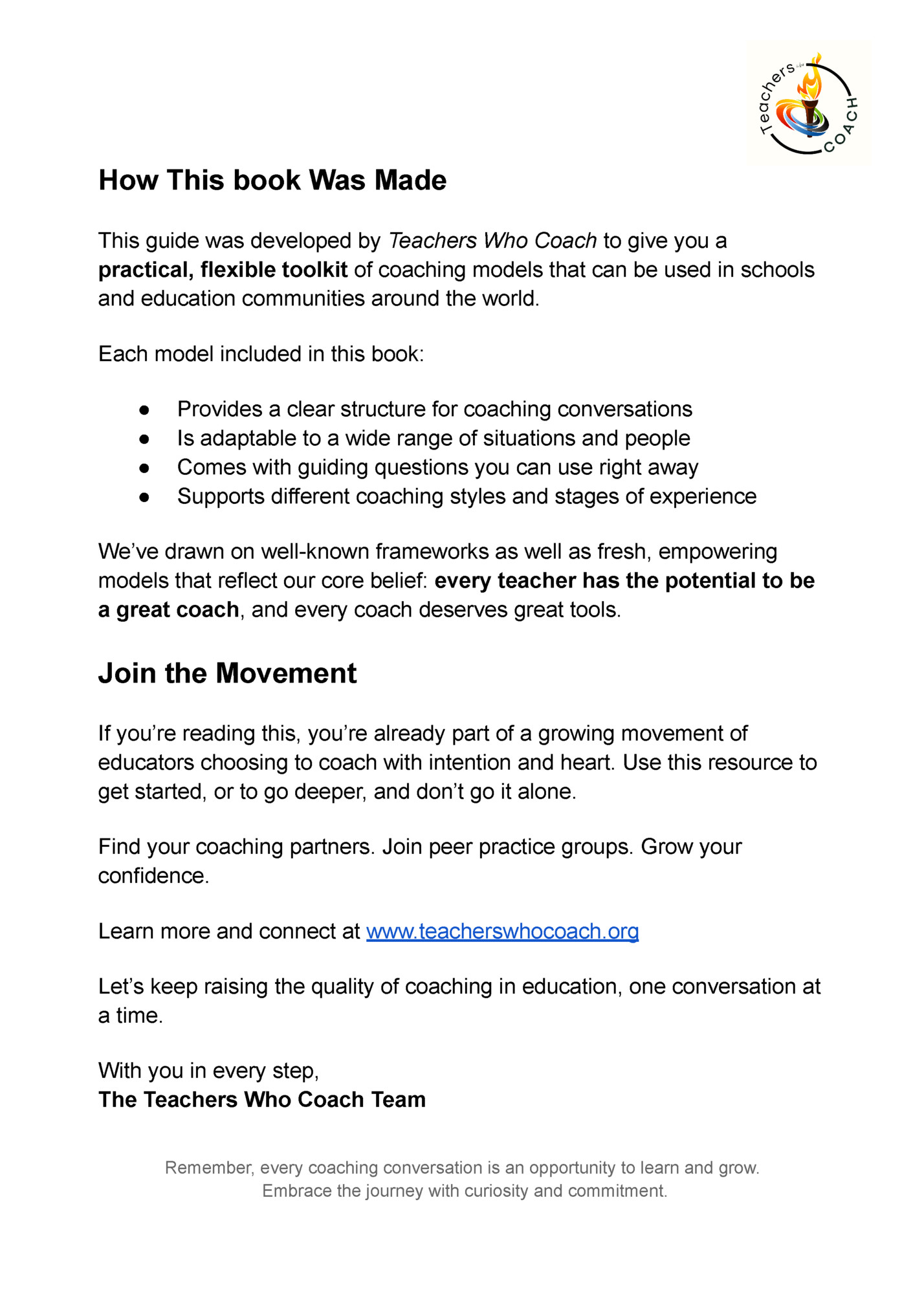
OSKAR Coaching Model The OSKAR model is a solution-focused coaching framework that emphasizes practical progress through scaling, strengths, and structured review. It supports coachees in clarifying goals, identifying existing resources, and making incremental steps toward meaningful change. CLEAR Coaching Model Developed by Peter Hawkins, the CLEAR model provides a structured, conversational flow for coaching sessions. It emphasizes building rapport, defining goals, exploring current reality, taking action, and reviewing progress, making it ideal for performance and leadership coaching. STEPPA Coaching Model The STEPPA model focuses on the emotional dimension of coaching, guiding coachees from defining a Subject, setting a Target, exploring Emotions, examining Perceptions, and then moving through Planning, Action, and Assessment. It’s especially effective for emotionally complex or high-stakes goals. ACHIEVE Coaching Model This results-oriented model supports coachees in analyzing their current situation, creatively brainstorming, refining goals, initiating action, evaluating progress, adjusting plans, and staying motivated. It’s well-suited to structured developmental coaching and performance improvement. Remember, every coaching conversation is an opportunity to learn and grow. Embrace the journey with curiosity and commitment.
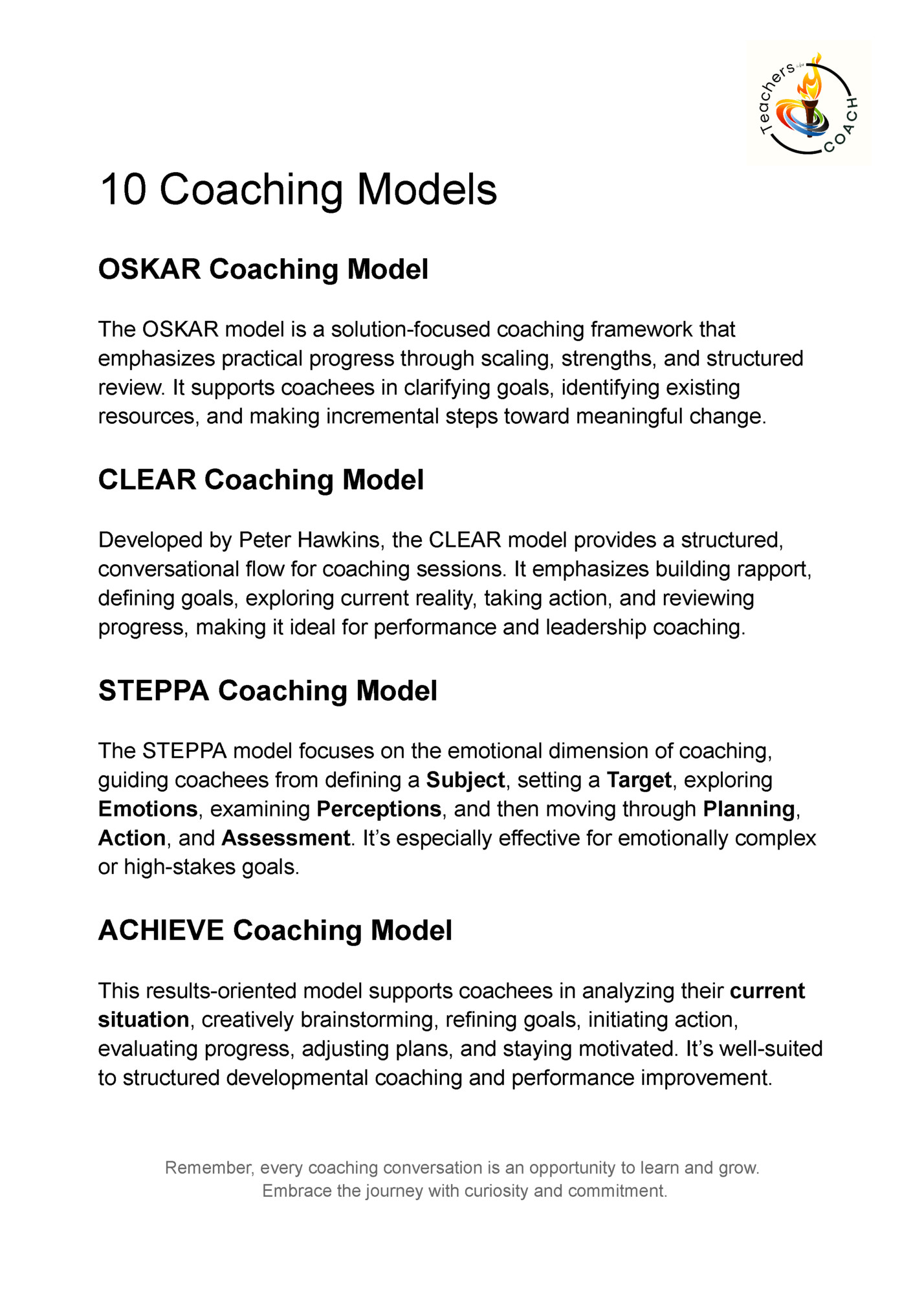
The GIIFTS model emphasizes the coachee’s Goal, Ideal outcome, potential Impediments, Facilitators, available Tools, and the ultimate definition of Success. It’s a strengths-based and forward-looking framework for empowering coachees to plan and succeed with clarity. ABCDE Coaching Model Rooted in cognitive-behavioural principles, the ABCDE model supports emotional regulation and mindset shift. It explores the Activating event, related Beliefs, their Consequences, Disputes to challenge unhelpful beliefs, and Effective new beliefs to support growth and well-being. GATHER FAME Coaching Model The GATHER FAME model blends relationship-building with action planning. It begins with a warm Greeting, uses inquiry to Ask, Tell, and Help, then cycles through Explanation, Return, and the FAME steps of Follow-up, Apply, Monitor, and Evaluate, great for long-term coaching partnerships. LASER Coaching Model This model encourages focused, transformative change through Learning, Assessing the present, Story-making to shift perspective, Enabling ownership, and Reframing obstacles into opportunities. It’s ideal for mindset work and long-term growth. Remember, every coaching conversation is an opportunity to learn and grow. Embrace the journey with curiosity and commitment.
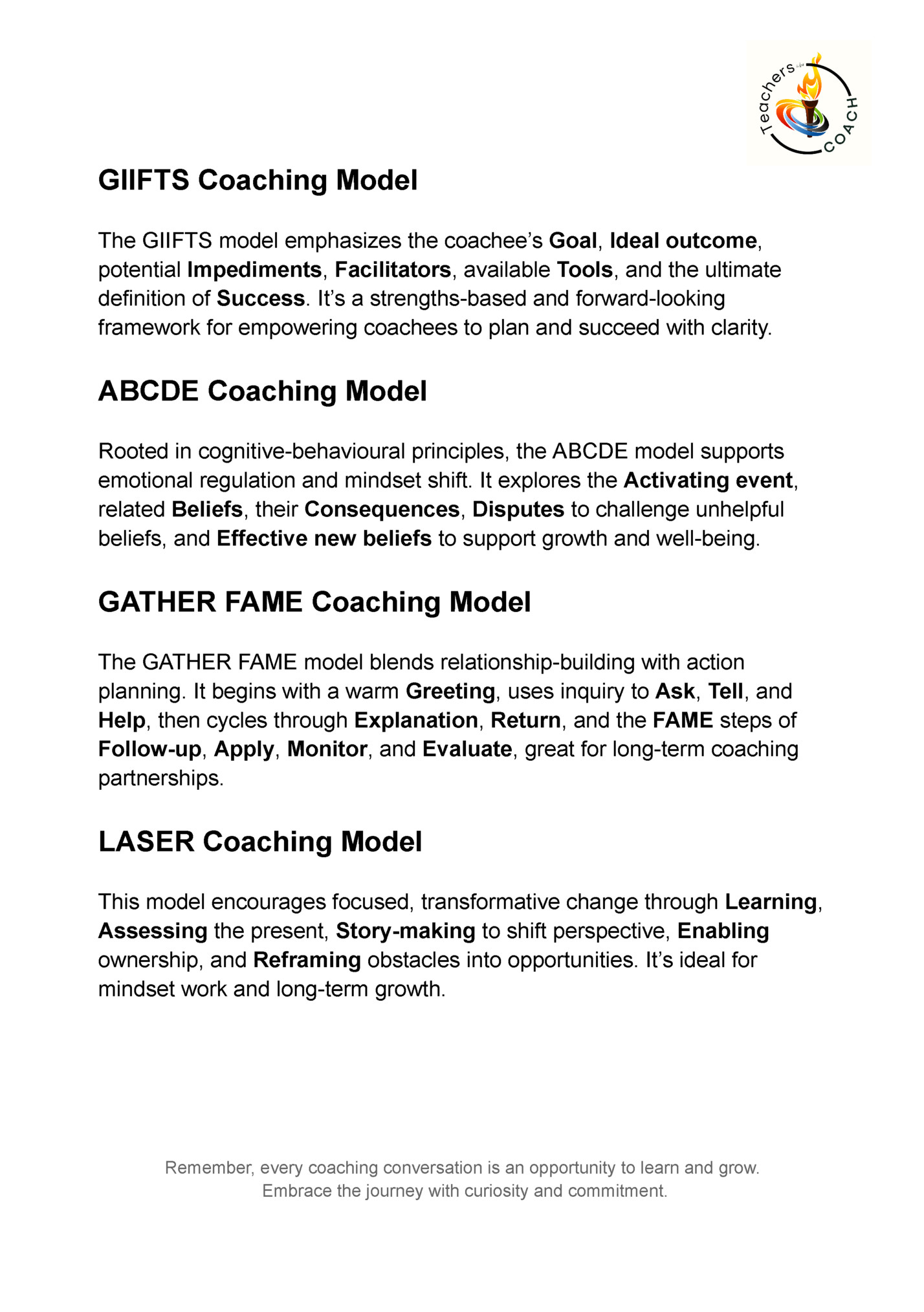
Fleepit Digital © 2021